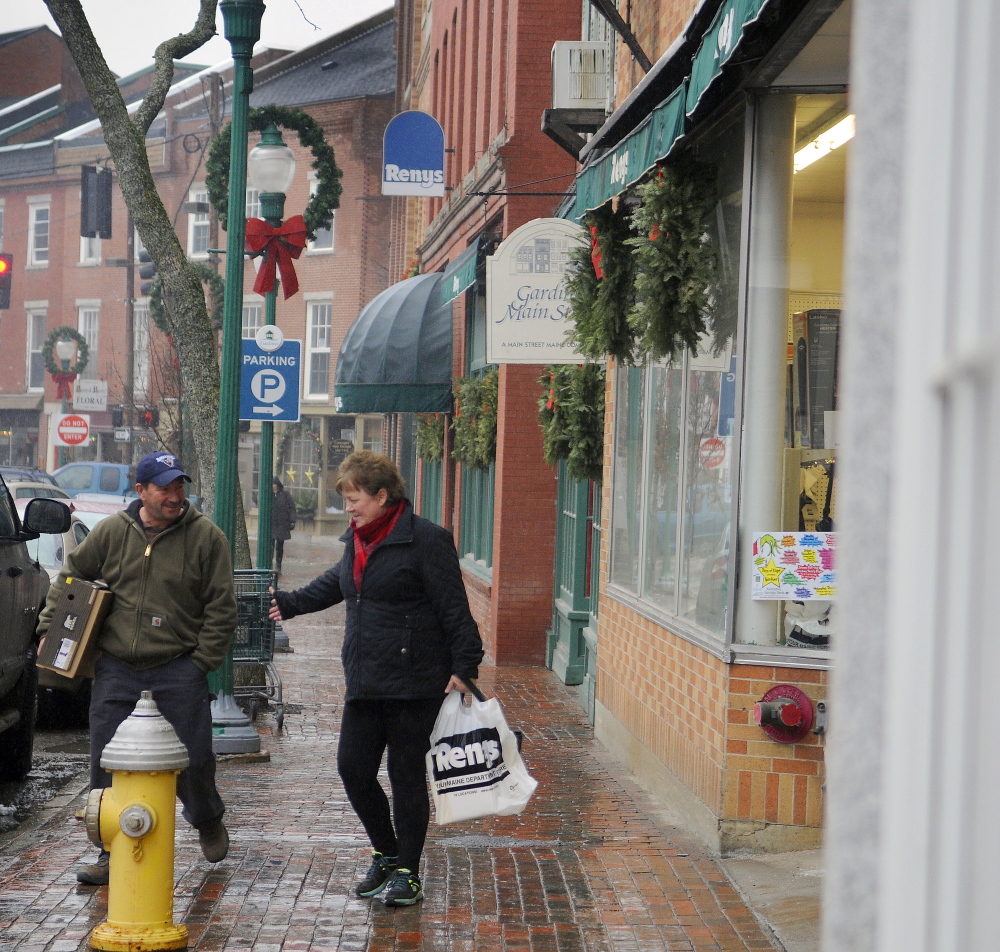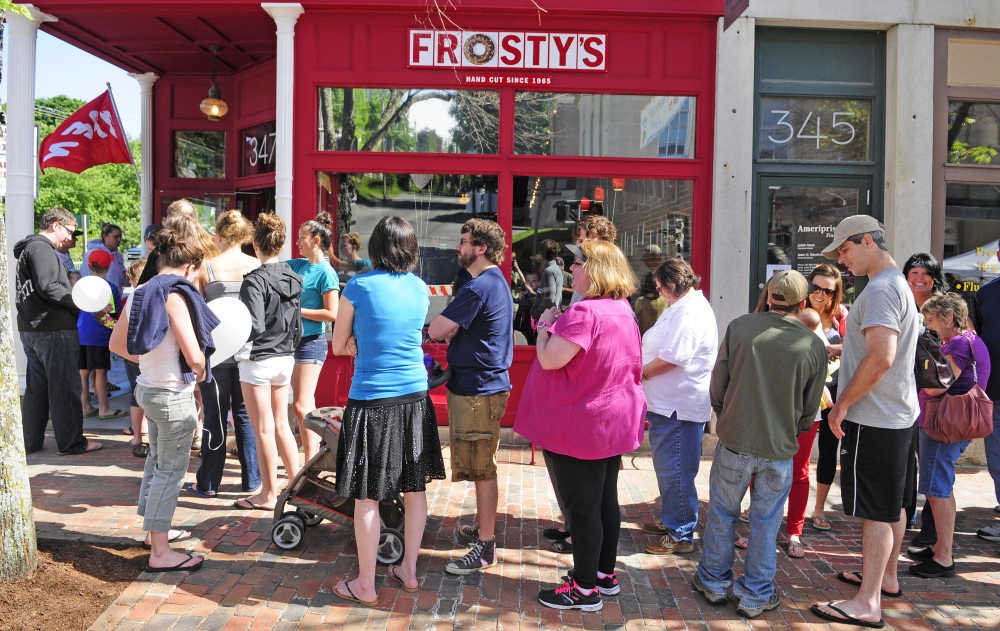The city of Gardiner won’t fill its vacant economic and community development director position and will instead distribute the duties to other employees or outside contractors to help close an expected budget gap next year of more than $500,000.
The City Council approved the proposal at its meeting Dec. 17, but not before some voiced concern that $22,000 in projected annual savings aren’t worth the risk and that the changes could jeopardize recent progress made in the city’s economic development efforts.
The city reviewed the need for a full-time economic and community director position after Nate Rudy, who held the position for three-and-a-half years, announced he would be leaving in early December to become executive director at Waterville Creates.
The proposal from City Manager Scott Morelli approved by councilors earlier this month calls for the city to outsource most economic development functions to the executive director of Gardiner Main Street, Patrick Wright, and increase the amount of funding available for a contract planner. Morelli will also assume administrative duties, including overseeing the code enforcement officer, contract work and the U.S. Environmental Protection Agency brownfields project. The city will restore the Economic Development Committee to assist Morelli, and Rudy will continue to market property in the city’s Libby Hill Business Park as a real estate agent with Brookwood Realty.
Morelli prefaced his presentation earlier this month with the most recent budget outlook for the fiscal year starting in July. The city is projecting a deficit of around $518,000. That deficit includes all capital investment requests, but it doesn’t include any cost of living increases for employees, increases in the school or county budgets, or decreases in municipal revenue sharing from the state, Morelli said.
“While it certainly doesn’t solve the problem, it goes a long way to trying to address it,” he said.
If the city wasn’t facing such a large budget gap, Morelli said he wouldn’t have proposed the cost-saving measures in the economic development office. In an ideal world, the city would have a full-time development director and a planner on staff, he said. Morelli proposed the changes as a stop-gap measure until the city is on better financial footing, but he said he thinks it could work long term as well.
“We’re trying to make the best of a bad situation,” he said.
Steve Marson, owner of the River Road Variety in South Gardiner and president of the Gardiner Board of Trade, doesn’t think the savings are enough to justify cutting the position.
Marson told councilors not lose sight of where the city has been and where it’s going. The business incentives program, Gardiner Growth Initiative, has attracted a couple of new businesses in the downtown area — including the popular Frosty’s Donuts — and was the result of collaboration between the board of trade, Gardiner Main Street, the city and the Bank of Maine, Marson said. He also praised Rudy’s work as economic director.
He said the city has built up a lot of momentum over the last few years, and these changes put that at risk.
“I just think it’s a combination of everybody, and when you take one of those pieces away from it, the potential for it to stop happens,” Marson told councilors.
Marson, who owns property in the city, said the board of trade hadn’t yet had a chance to discuss the issue, so he was speaking as a business owner and taxpayer.
In a phone interview Wednesday, Marson reiterated his position that the savings aren’t worth what the city will lose by not replacing Rudy. He also pointed out that the city previously faced criticism from some residents for giving $25,000 annually to Gardiner Main Street. If the city contracts out some economic development duties to the nonprofit organization, the city will be providing it around $26,500 more each year.
The amount the city gives to nonprofit organizations, particularly the roughly $100,000 given to Gardiner Main Street, the Boys & Girls Club of Greater Gardiner and Johnson Hall Performing Arts Center, fell under scrutiny last budget season and during a debate prior to the November elections for the council and mayor seat.
One incoming councilor, Maureen Blanchard, who received the second-most votes in November, was a vocal critic of the funding provided to those three nonprofit organizations.
If the city contracts with Gardiner Main Street, the downtown organization would use the money to move a part-time employee to full time, allowing Wright to do more of the work Rudy was doing with potential businesses and leading them through city approval processes.
Councilor Logan Johnston, one of two who voted against the proposal, said he finds it difficult to stop investing now because it feels as if the city has almost crossed the finish line.
“I really believe that now is not the time to give up on our investment, and I perceive this as giving up on our investment,” Johnston, an at-large councilor, said.
Johnston, who lost in the November election, said he has confidence Wright will give his all, but he’s concerned because there a few large projects upcoming in the city.
Rudy, left the city to become the executive director of Waterville Creates, an arts and culture consortium. He said he fully supported the plan, given the city’s financial outlook. He said he’s confident others in the community and with the city will be able to fill the holes left by his departure.
Councilor Pat Hart, who represents District 2, voiced support for the plan because she thinks having the additional funding for a contracting out planning work will provide a stronger portfolio of services.
Previously, the city set aside $3,000 for planning work, such as developing ordinance changes, and gave Rudy an additional $5,000 to do some planning duties, Morelli said. The $15,000 the city plans to set aside for a contract planner will help the city implement the zoning changes proposed in the new comprehensive plan councilors approved earlier this year, Morelli said.
Mayor Thomas Harnett agreed with Hart that the planned changes don’t represent an end to investing in economic development.
“I don’t see this as a retrenchment,” Harnett said at the meeting. “I see this as we are in a difficult economic time. The budget deficit is a reality. Does this solve the budget deficit? No.”
But finding these types of savings can add up to salvaging the budget for next fiscal year, he said.
“In a perfect world, we probably would hire a new economic and community developer, but we’re just not in a perfect financial world right now,” Harnett said. “I think this is the best solution given the assets that we have and the money we need to address the upcoming budget.”
Paul Koenig — 621-5663
Twitter: @paul_koenig
Send questions/comments to the editors.





Success. Please wait for the page to reload. If the page does not reload within 5 seconds, please refresh the page.
Enter your email and password to access comments.
Hi, to comment on stories you must . This profile is in addition to your subscription and website login.
Already have a commenting profile? .
Invalid username/password.
Please check your email to confirm and complete your registration.
Only subscribers are eligible to post comments. Please subscribe or login first for digital access. Here’s why.
Use the form below to reset your password. When you've submitted your account email, we will send an email with a reset code.